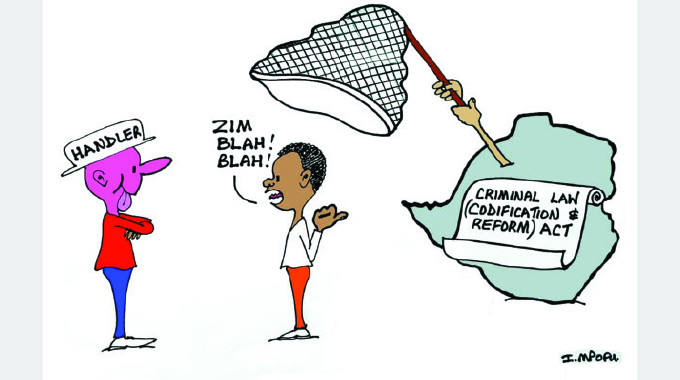Lawyer spearheads development in Sanyati

Fidelis Munyoro recently in Sanyati
Charitable giving was once a trait that people highly treasured and rather than holding onto wealth, it was necessary to give anything you could to benefit the underprivileged in society.
For Sanyati-born lawyer Advocate Thembinkosi Magwaliba, the act of giving started when he helped Makwechere Primary School, his local school in Sanyati, by sponsoring prizes and ECD playground equipment consistently more than seven years ago.
But as many other schools in Sanyati rural areas also needed help, he assisted the Success for Sanyati Charitable Foundation (SSCF) by way of a deed of trust.
“In fact, the community needed assistance in all sorts of other areas such as water, sanitation, health livelihoods, seed maize and vegetable seeds,” said Adv Magwaliba, the brain child of SSCF.
“The idea was to help as many communities as possible in Sanyati and contribute in my own way to the empowerment of the Sanyati community in accordance with the dictates of the National Development Strategy (NDS1) and the Second Republic’s Vision 2030.”
Since the establishment of the foundation in 2020 Sanyati communities in Mashonaland West are benefiting from development and tillage programmes destined to improve the economic and social well-being of the locals adding stimulus to development in the area.
The foundation has helped with the construction of school blocks at Madzivaenzou Secondary School and Sarukweza Primary School, while Jompani Secondary School and Chirikiti Primary School benefited from roofing materials.
Renovation of school blocks, establishment of community gardens, provision of seed maize, sorghum and bean seeds for the community are some of the benefits which the villagers receive from the foundation.
The foundation has also set up community bakeries, provided borehole pumps for schools, renovated chiefs courts and paid schools fees for hundreds of pupils in Sanyati.
“In short, we have significantly impacted the lives of the whole community in a positive and beneficial way,” said Adv Magwaliba. “We subscribe and are inspired by the values of the Second Republic that no place and no one should be left behind.
“We continue to value our leadership in Zimbabwe which has created an enabling environment for the community empowerment projects in Sanyati.”
Sanyati is illustrious for its rich soils and natural resources. But over the past years countersigned a surge in population growth resulting in increased demand for basic amenities such as schools, health facilities, water and sanitation, among other social conveniences.
The growing population resulted in the diminution of resources and strained existing social infrastructure holding back progress in the area.
This left the communities resigned to developmental doom.
But the coming in of SSCF, communities have been thrown a life-line as the Magwaliba-inspired development projects are now providing a spring-tide to changing the lives of many in Sanyati rural areas.
Already, the projects have won the hearts of the people who are now rallying behind the developments viewed as the prescription needed to change the face of Sanyati and become a leading example of rural headway.
The NDS1 is very clear on the significance of rural advancement and this is being transmuted into practical action.
“In a small way the foundation has done a great job in the area of development,” said Mr William Neuso, the secretary to Chief Neuso. “The communities are benefiting from the foundation’s all-inclusive empowerment projects in the area.”
Agriculture is the bedrock and critical sector of the economy which contributes to the growth and sustainable development of the nation.
Now the foundation is currently providing tillage services to villagers at the cost of diesel only.
The foundation has sourced two tractors from ARDA Sanyati, with villagers contributing for procurement of diesel. Since the start of the tillage programme more than 152 households in four Wards have so far benefited from the scheme.
The pass-on scheme started with very few people, but now the demand for the services has increased to an unprecedented level, with more villagers wanting the support of the scheme, for the first time.
“The scheme reduces costs when you pool resources and many people are coming on board, hence the need to source for more tractors to meet the demand,” said Mr Braveman Nyamuruswa, councillor for Ward 4 and coordinator of the tillage scheme.
“We are grateful to Magwaliba, he is doing a great job and we pray as communities in Sanyati that he continues with his helping hand for our communities to continue developing.”
While the empowerment projects have impacted positively on the villagers, they have bestowed a role model status upon Adv Magwaliba, as elders in the communities are now encouraging the youths and other resource well-up people in the area to emulate the lawyer.
“We encourage our children here to emulate Magwaliba and look back at the communities they come from and do something,” said Mr Nyamuruswa. “That way we can develop and brick by brick we can develop our nation. Patriotism starts with your communities first.”
And most villagers unanimously agreed that Adv Magwaliba has brought to home President Mnangagwa’s mantra that “nyika inovakwa nevene vayo”, a growth oriented strategy to transform the country’s economy into an upper middle income by 2030 using local resources, local ideas and innovations.
A beneficiary of the tillage scheme, Mr Trynos Hapazari commended the scheme and the development taking place in the area saying, this should stick out as a clarion call for people in Sanyati to take the development into their own hands and move the nation forward.
“I am very excited by the scheme. It has helped me to do better this time in terms of tilling the land and now expecting better yields if we get good rains,” he said. “The costs are absolutely unbelievable, you just need a few litres of diesel and you are home and dry.”
Another villager Mr Nevas Ndawana, who was eagerly waiting for his turn, said the pass-on scheme has been well-received in the area as many people were coming on board.
“We have submitted our names for the tillage services which are almost for free given our small contributions for the procurement of diesel,” he said. “I cannot be left behind. Everyone here is rallying behind the programme, it’s quite helpful.”
Sanyati has sufficient agriculture potential with vast natural resources that can be managed to feed the country and with the Second Republic providing leadership in agriculture and food security by formulating positive policies on agriculture, many people’s lives are getting better.
The realisation that rural development is fixed on agriculture, has seen the Government active in its continuous programme of building dams.
This has seen Marovanyati Dam in Buhera, Muchekeranwa Dam at the border of Manicaland and Mashonaland East, Tugwi Mukosi Dam in Chivi South and many others. One of the biggest dams, Lake Gwayi-Shangani in Hwange District, now nears completion.
Government has also embarked on boosting food production and rural incomes under Pfumvudza/Intwasa, a concept aimed at climate-proofing agriculture by adopting conservation farming techniques and involves the use of small areas and applying the correct agronomic practices for higher yields and so returns, rather than having large fields with low yields or zero yields if the crop fails.
The concept, which is mostly applied to maize, traditional grains and cotton is also meant to accelerate the commercialisation of smallholder agriculture and mechanising Pfumvudza/Intwasa makes life easier for some farmers who do not have the capacity to do potholing manually, such as old people and child-headed families.
Most of the Zimbabwean population reside in the rural areas nonetheless they are characterised by low-slung levels of productivity, infertile soils, lack of proper access and control of natural resources, lack of proper infrastructure, roads, schools, among others. So, developing rural areas is vital to addressing the regional inequalities which were created by the colonial government through the implementation of exclusionary and biased policies.
And in its quest to achieve the upper middle income economy by 2030, the Second Republic must strengthen and enforce its strategies designed for refining the standard of living and economic well-being of people living in rural areas.
Once this is accomplished, rural development can also lead to sustainable diversified livelihood portfolios and participation of the community in the decision-making process of their community development which can lead to poverty reduction and an improvement in the standard of living.









Comments